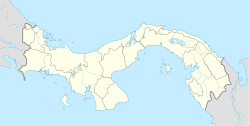La Palma, Darién facts for kids
Quick facts for kids
La Palma
|
|
|---|---|
|
Corregimiento and town
|
|
| Country | |
| Province | Darién |
| District | Chepigana |
| Area | |
| • Land | 526.6 km2 (203.3 sq mi) |
| Population
(2010)
|
|
| • Total | 4,205 |
| • Density | 8/km2 (20/sq mi) |
| Population density calculated based on land area. | |
| Time zone | UTC−5 (EST) |
| Climate | Aw |
La Palma is a town and a special kind of local government area called a corregimiento in Chepigana District, Darién Province, Panama. It's an important place because it's the main town for the Chepigana District. In 2010, about 4,205 people lived there.
This town is located in a very special spot. It sits right where the wide Tuira River flows into the Golfo de San Miguel (which is a large bay). Another river, the Chucunaque, joins the Tuira River further south.
Contents
What is La Palma?
La Palma is a small but important town in the Darién Province of Panama. It serves as the administrative center for the Chepigana District. This means it's where many local government offices are located.
Population Changes
Over the years, the number of people living in La Palma has changed. In 1990, it had a larger population of 11,632. By 2000, the population had decreased to 3,884. Then, in 2010, it grew slightly to 4,205 people. These changes can happen for many reasons, like people moving for jobs or other opportunities.
Location and Climate
La Palma's location is key to its role in the region. It's found at the mouth of the Tuira River, where the river meets the large Golfo de San Miguel. This makes it a natural hub for river and sea travel in the area.
Tropical Climate
The climate in La Palma is known as a tropical savanna climate, often called "Aw" in climate maps. This means it's generally warm all year round. There are usually two main seasons: a wet season with lots of rain and a dry season with less rain. This type of climate is common in areas close to the equator.
Economy
La Palma is the main trading center for the large, mostly empty region around it. Because it's located on the river and near the bay, it's a good place for goods to be brought in and out.
Local Products
Farmers in the area grow crops like plantains, corn, and rice. These are important foods for the local people. They also raise livestock, which means animals like cows or pigs. There is also some sawmilling, which is the process of cutting timber into planks or boards. This suggests that wood is an important resource from the surrounding forests.
Transportation Challenges
One of the biggest challenges for La Palma is that it's quite isolated. There are no major highways connecting it to other towns in central and western Panama. This means that most travel and trade happens by boat along the rivers and coast. This isolation can make it harder for people and goods to move around, but it also helps preserve the unique natural environment of the Darién region.
See also
 In Spanish: La Palma (Darién) para niños
In Spanish: La Palma (Darién) para niños
 | George Robert Carruthers |
 | Patricia Bath |
 | Jan Ernst Matzeliger |
 | Alexander Miles |







